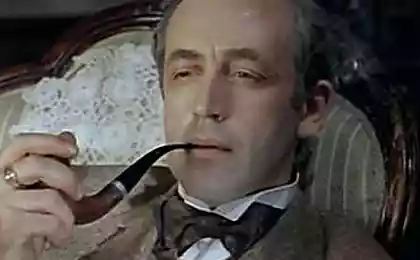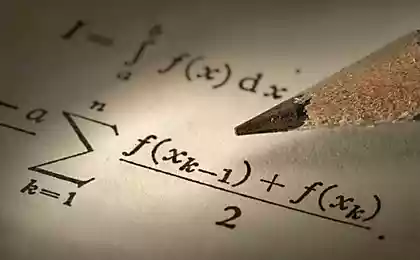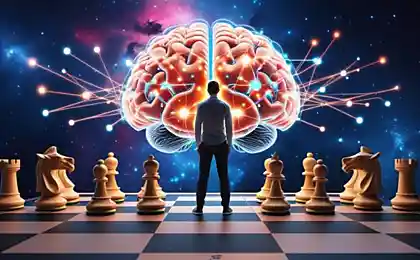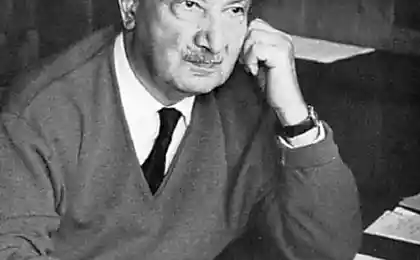545
The method Sherlock: how to develop observation, deduction and flexibility of thinking
Thirty nine million four hundred sixty two thousand sixty three
scene from the movie "Sherlock Holmes and Dr. Watson»
Training millennially spontaneous response to the question how to be Sherlock, could sound like: "For a start, buy yourself a black coat". If to use the terminology of the American psychologist, Nobel laureate Daniel Kahneman, released in 2011, the book "Think slowly... decide quickly", is the reaction of the so-called "fast thinking" system that is responsible for the immediate knowledge of the world and cataloging the instinctive sensations. "Quick thinking" reacts to the circumstances immediately and very directly, with the result that often wrong, causing us to make irrational decisions.
But in order to think like Sherlock Holmes, you need to use another system — "slow". It was she, according to Kahneman, is responsible for the deliberate and conscious formation of ideas, solutions, conclusions and evaluations. As any function of the human brain, a system of slow thinking can be strengthened and developed.
As in sports, the workout should start with light exercises in a small amount, gradually moving to more complex and lengthy. For starters, you can borrow from friends a few school textbooks in different subjects: mathematics, physics, chemistry, and other disciplines that involve problem solving. This will help not only to train the slow thinking system (because in the process of intellectual activity used it), but also to expand horizons, restoring lost since the knowledge in the school and planned to study interesting scientific field.
Corrosiveness is another value that you want the future master of deduction. To raise it, we need to find areas that really excite curiosity. What they will be, by and large, it does not matter: the emotional response always pushes us to a deep study of the subject, causes him to constantly increase the volume of knowledge, and with it the length of the border of contact with the unknown, the existence of which invariably impels the mind to new research.
Deduction and indukcija mind will be prepared and saturated with a variety of useful information, you can go to exercises for the development of logical thinking: deductive and inductive. Because the character Conan Doyle used both methods — which, alas, shown in the BBC series "Sherlock" is somewhat weaker than in the books of Arthur Conan Doyle.
Deduction is a method by which a private logically derived from the General: "All metals conduct electricity. Gold is a metal. This means that gold conducts electricity". Induction, on the contrary, the total outputs from the private: "I am a Muscovite and I remember that snow fell every winter. So, in Moscow in the winter there is always snow." Sherlock Holmes, examining the crime scene, or evaluating others, often went from the particular to the General and back again, freely moving in both logical directions, "John's military bearing, a tan only till the sleeves, a psychosomatic limp, it means that they have been to war. Where were the military operations lately? in Afghanistan. So, the war in Afghanistan."
However, his main reasoning was deductive and arose in the mind of the great detective when he tore his violin and thinking, and Smoking a pipe. In these moments, Sherlock Holmes turned to his phenomenal knowledge of history and criminology and have classified the case based on "the family tree of crime." He was assigned a place in the group: "Murder for inheritance", "crime of passion", "the Theft of the will," etc. It gave a motive, and the motive of the suspects was given. This was the essence of the deductive method of Sherlock Holmes. The induction gave him food for thought, while the deduction gave the answer.
For training of logical thinking, there are many exercises. For example, "Concepts of order", in which it is necessary to have a few words from private to shared or Vice versa. Can be useful also chess or poker. In addition, it is important to learn how to avoid in judgments logical errors, studying them, for example, in the book of Abner Remove "Logical error. As they hinder right thinking".
How to cultivate sisyastoy to learn to notice details, to interpret them correctly and not be distracted during the observations and analysis, you will need exercises to develop voluntary and involuntary attention but also exercise the flexibility of thinking.
Involuntary attention is the system reaction to stimuli, a kind of "peripheral vision" in terms of perception of reality. To develop it, you can take it a rule to observe familiar objects and sometimes the lack of lighting and different background (in vivo, music and under the harsh unpleasant sounds), and also to get used to note details that attract attention in the transition from one type activity to another. This allows you to cultivate a sensitivity to the fluctuations of reality and learn not to miss interesting details that can be the key to the situation or the person's character.
Voluntary attention, or, simply, concentration also plays a huge role to cultivate the ability to think clearly. On average, thanks to the willpower of man is able to keep the attention on the object just 20 minutes. To improve this indicator, suitable exercises with the so-called "Entertaining table" and its analogues. Each such table is a structure with randomly arranged and differently depicted with numbers 1 to 35 or 1 to 90. The task is to find all numbers in ascending or descending order, putting in the least amount of time.
To train attention to detail, you can also by taking in the habit of observation of strangers: at work, on the street, in social networks. In this case, it is important to assess the person from different angles, giving a few answers to questions about what profession that he can do what his family situation, character and habits. This will allow you to develop flexibility of thinking and to stop every time to settle for the only answer which may be incorrect with higher probability.
However, the secret of the devil's observation, it seems, lies not in the amount of training, and in the presence of strong interest. Because with the increasing emotional value of the subject matter and the appearance is sufficient to automate actions of experience a person has so-called posleprodazhnoe attention, the focus of which may not subside for hours. It posleprodazhnoe attention allowed Sherlock Holmes to solve crimes. It also helps scientists to make discoveries, writers — find the best wording, etc. in addition, the presence posleprodazhnogo attention is still nice: it relieves the psyche, because the brain ceases to spend energy to maintain focus and can throw bodies at the solution of tasks.
Fifty five million three hundred seventy seven thousand nine hundred thirty
Maria Konnikova, writer, author of "a brilliant mind. To think like Sherlock Holmes»
— Sherlock Holmes is not just a thought slowly — he understands what it takes to separate objective and subjective thinking. When you see someone, you inevitably related associations, and you will quickly decide be it good or bad. The exercise, which would be used to combat this, Sherlock, is to ask: "What's in what I think and feel is my subjective assessment? I'm just going to keep this in mind, making your real opinion."
In addition, if we want to assess the reality more objectively, it is important to understand why we made the judgement, and test yourself by learning from the man himself, his friends, or on the Internet, right we were or not. Such a possibility is not always so for training you can use posted online video courses. In their framework it is possible to observe the participants of the special scenes to evaluate, they are lying or not, and then learn the correct answer.
Doctors and lawyers use the skills of logical thinking and the habit of being constantly focused, but these abilities are useful in any profession. Even for writers it is important to understand people and be able to focus on work, not constantly checking email or social networks. Working on my book "mastermind", for example, I realized that I don't tend to keep the focus of attention. I tried an effort to force myself not to get distracted by the Internet, but it was incredibly hard. Then I installed a program on your computer Freedom, which blocks a global network of a given time from two minutes up to eight hours. It helped me a lot. We may recall that Sherlock Holmes also deliberately created the conditions for the thought process: he played the violin, Smoking a pipe and even drove Dr. Watson to not be disturbed.
But how can that be, when we can't isolate ourselves from the external environment? It seems that Conan Doyle is helping to answer this question. Many people say that Sherlock Holmes was the cold, but it is not so: he experiences all the same emotions as any other human being, but he knows how to push them aside and accept the situation without a subjective evaluation. This skill you need to cultivate specially. To do this, you can start a notebook with two or three columns: "Objective observation", "Subjective evaluation" and "what can be a subjective assessment." Holmes has been keeping it in mind, but we, before it becomes a habit, you need to take notes.
I think in the modern world investigations "Sherlock Holmes" has become smaller because of the dominance of technology. Instead try using logic to understand whether the suspect is lying, we are trying to estimate the speed of the heartbeat, or to perform the work of the brain. However, in my opinion, we know about the brain too little in order to entirely rely on existing technology analysis of its reactions. published
P. S. And remember, just changing your mind — together we change the world! ©
Source: theoryandpractice.ru
scene from the movie "Sherlock Holmes and Dr. Watson»
Training millennially spontaneous response to the question how to be Sherlock, could sound like: "For a start, buy yourself a black coat". If to use the terminology of the American psychologist, Nobel laureate Daniel Kahneman, released in 2011, the book "Think slowly... decide quickly", is the reaction of the so-called "fast thinking" system that is responsible for the immediate knowledge of the world and cataloging the instinctive sensations. "Quick thinking" reacts to the circumstances immediately and very directly, with the result that often wrong, causing us to make irrational decisions.
But in order to think like Sherlock Holmes, you need to use another system — "slow". It was she, according to Kahneman, is responsible for the deliberate and conscious formation of ideas, solutions, conclusions and evaluations. As any function of the human brain, a system of slow thinking can be strengthened and developed.
As in sports, the workout should start with light exercises in a small amount, gradually moving to more complex and lengthy. For starters, you can borrow from friends a few school textbooks in different subjects: mathematics, physics, chemistry, and other disciplines that involve problem solving. This will help not only to train the slow thinking system (because in the process of intellectual activity used it), but also to expand horizons, restoring lost since the knowledge in the school and planned to study interesting scientific field.
Corrosiveness is another value that you want the future master of deduction. To raise it, we need to find areas that really excite curiosity. What they will be, by and large, it does not matter: the emotional response always pushes us to a deep study of the subject, causes him to constantly increase the volume of knowledge, and with it the length of the border of contact with the unknown, the existence of which invariably impels the mind to new research.
Deduction and indukcija mind will be prepared and saturated with a variety of useful information, you can go to exercises for the development of logical thinking: deductive and inductive. Because the character Conan Doyle used both methods — which, alas, shown in the BBC series "Sherlock" is somewhat weaker than in the books of Arthur Conan Doyle.
Deduction is a method by which a private logically derived from the General: "All metals conduct electricity. Gold is a metal. This means that gold conducts electricity". Induction, on the contrary, the total outputs from the private: "I am a Muscovite and I remember that snow fell every winter. So, in Moscow in the winter there is always snow." Sherlock Holmes, examining the crime scene, or evaluating others, often went from the particular to the General and back again, freely moving in both logical directions, "John's military bearing, a tan only till the sleeves, a psychosomatic limp, it means that they have been to war. Where were the military operations lately? in Afghanistan. So, the war in Afghanistan."
However, his main reasoning was deductive and arose in the mind of the great detective when he tore his violin and thinking, and Smoking a pipe. In these moments, Sherlock Holmes turned to his phenomenal knowledge of history and criminology and have classified the case based on "the family tree of crime." He was assigned a place in the group: "Murder for inheritance", "crime of passion", "the Theft of the will," etc. It gave a motive, and the motive of the suspects was given. This was the essence of the deductive method of Sherlock Holmes. The induction gave him food for thought, while the deduction gave the answer.
For training of logical thinking, there are many exercises. For example, "Concepts of order", in which it is necessary to have a few words from private to shared or Vice versa. Can be useful also chess or poker. In addition, it is important to learn how to avoid in judgments logical errors, studying them, for example, in the book of Abner Remove "Logical error. As they hinder right thinking".
How to cultivate sisyastoy to learn to notice details, to interpret them correctly and not be distracted during the observations and analysis, you will need exercises to develop voluntary and involuntary attention but also exercise the flexibility of thinking.
Involuntary attention is the system reaction to stimuli, a kind of "peripheral vision" in terms of perception of reality. To develop it, you can take it a rule to observe familiar objects and sometimes the lack of lighting and different background (in vivo, music and under the harsh unpleasant sounds), and also to get used to note details that attract attention in the transition from one type activity to another. This allows you to cultivate a sensitivity to the fluctuations of reality and learn not to miss interesting details that can be the key to the situation or the person's character.
Voluntary attention, or, simply, concentration also plays a huge role to cultivate the ability to think clearly. On average, thanks to the willpower of man is able to keep the attention on the object just 20 minutes. To improve this indicator, suitable exercises with the so-called "Entertaining table" and its analogues. Each such table is a structure with randomly arranged and differently depicted with numbers 1 to 35 or 1 to 90. The task is to find all numbers in ascending or descending order, putting in the least amount of time.
To train attention to detail, you can also by taking in the habit of observation of strangers: at work, on the street, in social networks. In this case, it is important to assess the person from different angles, giving a few answers to questions about what profession that he can do what his family situation, character and habits. This will allow you to develop flexibility of thinking and to stop every time to settle for the only answer which may be incorrect with higher probability.
However, the secret of the devil's observation, it seems, lies not in the amount of training, and in the presence of strong interest. Because with the increasing emotional value of the subject matter and the appearance is sufficient to automate actions of experience a person has so-called posleprodazhnoe attention, the focus of which may not subside for hours. It posleprodazhnoe attention allowed Sherlock Holmes to solve crimes. It also helps scientists to make discoveries, writers — find the best wording, etc. in addition, the presence posleprodazhnogo attention is still nice: it relieves the psyche, because the brain ceases to spend energy to maintain focus and can throw bodies at the solution of tasks.
Fifty five million three hundred seventy seven thousand nine hundred thirty
Maria Konnikova, writer, author of "a brilliant mind. To think like Sherlock Holmes»
— Sherlock Holmes is not just a thought slowly — he understands what it takes to separate objective and subjective thinking. When you see someone, you inevitably related associations, and you will quickly decide be it good or bad. The exercise, which would be used to combat this, Sherlock, is to ask: "What's in what I think and feel is my subjective assessment? I'm just going to keep this in mind, making your real opinion."
In addition, if we want to assess the reality more objectively, it is important to understand why we made the judgement, and test yourself by learning from the man himself, his friends, or on the Internet, right we were or not. Such a possibility is not always so for training you can use posted online video courses. In their framework it is possible to observe the participants of the special scenes to evaluate, they are lying or not, and then learn the correct answer.
Doctors and lawyers use the skills of logical thinking and the habit of being constantly focused, but these abilities are useful in any profession. Even for writers it is important to understand people and be able to focus on work, not constantly checking email or social networks. Working on my book "mastermind", for example, I realized that I don't tend to keep the focus of attention. I tried an effort to force myself not to get distracted by the Internet, but it was incredibly hard. Then I installed a program on your computer Freedom, which blocks a global network of a given time from two minutes up to eight hours. It helped me a lot. We may recall that Sherlock Holmes also deliberately created the conditions for the thought process: he played the violin, Smoking a pipe and even drove Dr. Watson to not be disturbed.
But how can that be, when we can't isolate ourselves from the external environment? It seems that Conan Doyle is helping to answer this question. Many people say that Sherlock Holmes was the cold, but it is not so: he experiences all the same emotions as any other human being, but he knows how to push them aside and accept the situation without a subjective evaluation. This skill you need to cultivate specially. To do this, you can start a notebook with two or three columns: "Objective observation", "Subjective evaluation" and "what can be a subjective assessment." Holmes has been keeping it in mind, but we, before it becomes a habit, you need to take notes.
I think in the modern world investigations "Sherlock Holmes" has become smaller because of the dominance of technology. Instead try using logic to understand whether the suspect is lying, we are trying to estimate the speed of the heartbeat, or to perform the work of the brain. However, in my opinion, we know about the brain too little in order to entirely rely on existing technology analysis of its reactions. published
P. S. And remember, just changing your mind — together we change the world! ©
Source: theoryandpractice.ru
Garden tricks: 12 gold tips
Peter Mamonov: God, no matter what you do not believe in, the important thing is that He believes in you























